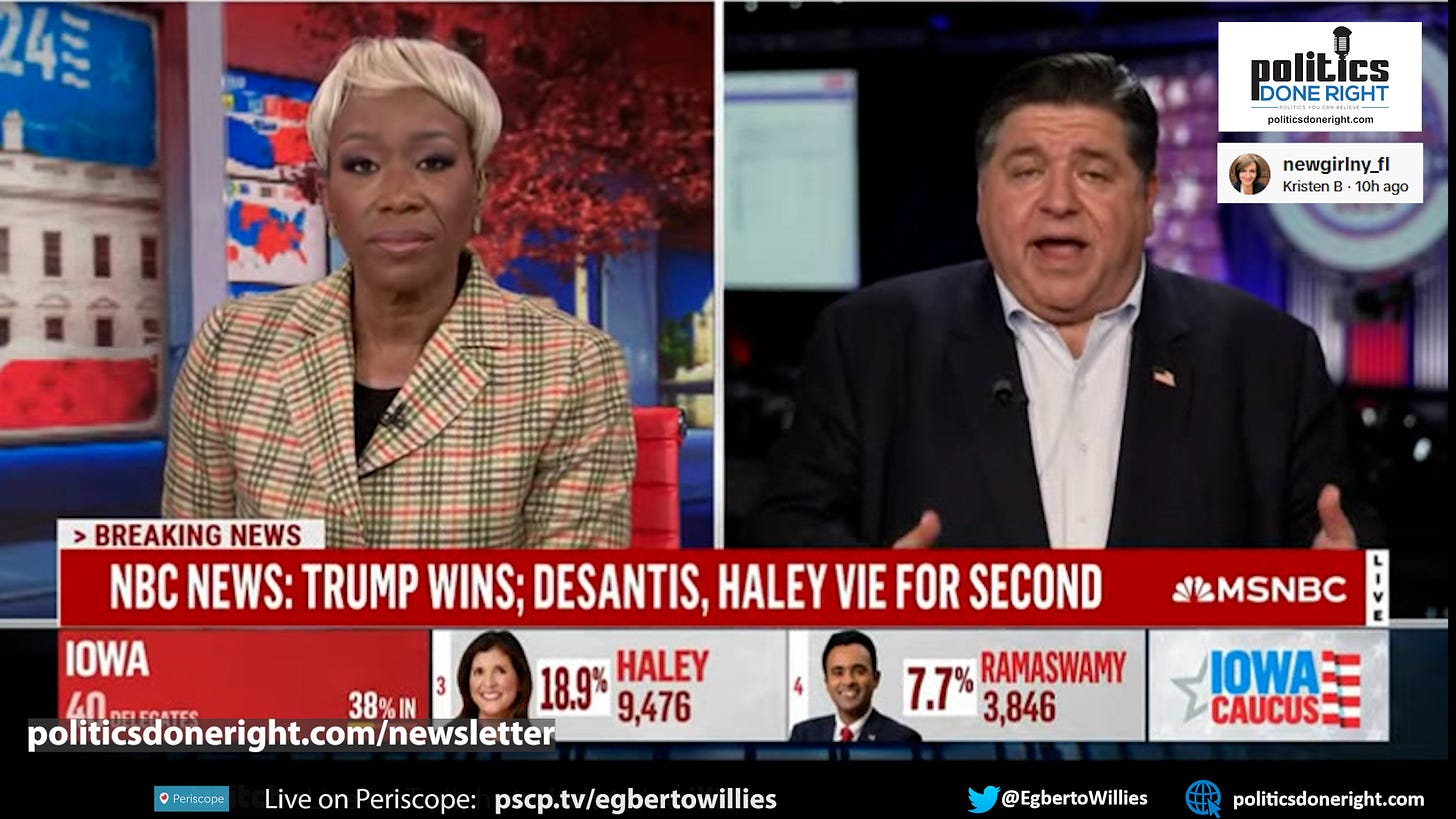Is Gov Pritzker’s tone deafness w/ Joy-Ann Reid’s concern about Biden’s acts & messaging 2016 again?
Listening to Gov. JB Pritzker’s (D-IL) disregard for the legitimate concerns Joy-Ann Reid pointed out from an important and significant portion of the Democratic coalition is reminiscent of ...
In a recent exchange, Governor JB Pritzker of Illinois demonstrated a concerning lack of sensitivity to the valid criticisms raised by Joy-Ann Reid regarding President Biden’s policies and messaging. This interaction is emblematic of a broader issue within the Democratic Party – a tendency to overlook or undervalue the concerns of its progressive base and younger voters, a misstep reminiscent of the party’s struggles in 2016.
Joy-Ann Reid, a respected journalist and commentator, raised poignant concerns about President Biden’s stance on issues such as the conflict in Gaza and his overall foreign policy approach. These are not trivial issues but are deeply connected to the moral and ethical values of a significant segment of the Democratic base, particularly among younger, Arab-American, Muslim-American, and African-American voters. Reid’s line of questioning was not just about critiquing for the sake of critique; it was about holding leadership accountable to the values and concerns of a diverse and morally conscious electorate.
Governor Pritzker’s response, however, fell short of addressing these concerns. His defense of President Biden centered around traditional talking points – the economy, gun violence, and a comparison to the policies of Donald Trump. While these are undoubtedly important issues, Pritzker’s failure to engage with the specific concerns raised by Reid represents a missed opportunity to demonstrate an understanding of and commitment to the broader range of issues that motivate the Democratic base.
This interaction reflects a larger pattern within the Democratic Party, where the voices and concerns of its most progressive and young members are often sidelined in favor of more moderate, traditional stances. While perhaps intended to appeal to a broader electorate, this approach risks alienating key segments of the party’s base. The issues raised by Reid – foreign policy, human rights, and ethical governance – are not peripheral concerns but are central to the values and vision of a significant portion of the Democratic electorate.
The Democratic Party, and by extension, its leaders and representatives, must recognize the importance of engaging with these concerns genuinely and thoughtfully. Dismissing or overlooking them not only undermines the party’s moral standing but also risks repeating the mistakes of the past, where a lack of engagement with the base led to electoral setbacks. The party must remember that its strength lies in its diversity and commitment to progressive values championing social justice, human rights, and ethical governance domestically and internationally.
The conversation between Pritzker and Reid is a microcosm of a larger issue within the Democratic Party – a disconnect between its leadership and the progressive, younger demographic increasingly shaping the party’s future. This demographic is not only concerned about domestic issues like the economy, healthcare, and gun violence but also about America’s role in international conflicts, its foreign policy, and the moral implications of these stances. The concerns about Gaza and the broader Middle East policies are not just political talking points; they are deeply rooted in a progressive worldview emphasizing empathy, global responsibility, and a commitment to peace and human rights.
This is not just about appealing to a subset of voters. It’s about aligning the party’s actions and messaging with its professed values. The Democratic Party, which prides itself on being a big tent, must ensure that this tent is inclusive of the voices and concerns of all its members, especially those who feel marginalized or unheard. It’s about understanding that progressive ideals are not fringe ideas but are central to the party’s identity and appeal. In fact, when queried on policies without assigning ideologies, most Americans agree on the socio-economic and political policies of progressives.
Governor Pritzker’s response to Reid’s questions seemed to reflect a broader issue of tone-deafness within the party’s leadership. There’s a growing sense among many in the party’s base that their concerns are often acknowledged in rhetoric but not in action. This disconnect could have serious electoral consequences, as seen in the 2016 election. The failure to fully engage with and address the concerns of the progressive base can lead to apathy and disillusionment, which in turn can result in lower voter turnout, a factor that can be detrimental in closely contested races up and down the ballot.
To avoid repeating the mistakes of the past, the Democratic Party must do more than just pay lip service to progressive ideals; it must actively incorporate these values into its policy-making and messaging. This means not only addressing economic and social issues domestically but also taking a strong and moral stance on international issues. The concerns of younger voters, particularly on issues of war and peace, are not just passing whims; they are deeply held beliefs that will shape their political engagement for years to come.
Gov Pritzker’s tone deafness w/ Joy-Ann Reid
The Democratic Party stands at a crossroads. It can continue down a path of ignoring or downplaying the concerns of its progressive and younger members, risking a repeat of the disconnect and disillusionment seen in 2016, or it can choose to genuinely engage with these issues and integrate them into its broader policy and messaging strategy. The conversation between Governor Pritzker and Joy-Ann Reid serves as a reminder of the importance of this choice.
The party must recognize that its success hinges not only on championing progressive policies but also on demonstrating a willingness to listen, understand, and act upon the concerns of all its constituents. This includes taking a strong stance on international issues and acknowledging the interconnectedness of domestic and foreign policy in a way that resonates with a morally conscious electorate.
As progressives, there’s a need to continue pushing for these changes within the party. The Democratic Party must not only be a vehicle for political aspirations but also a platform for moral leadership, both at home and abroad. It’s essential to remind the party leadership that progressive values are not a liability but a strength that can galvanize a broad coalition of voters.
The future of the Democratic Party depends on its ability to embrace and embody the progressive ideals that resonate with a significant portion of its base. This is not just about winning elections; it’s about shaping a future that aligns with the values of justice, equality, and peace – values that are at the heart of the progressive movement. The party must heed these calls, not as a matter of political expediency but as a commitment to its principles. Only then can it truly represent the diverse voices that make up its base and work towards a more equitable and just society.
Please listen to the included video clip or watch it here to understand the disregard with which the governor addressed Reid’s statement.
Become a supporting subscriber today.
Will you be a part of our Independent Progressive Media project to unclutter the misinformation of the Right and the timidity and corporate spin of the mainstream media today? A paid subscription to this Newsletter now is your way of ensuring I can continue to do this. It’s about a cup of coffee a month. As a token of appreciation, your paid subscription includes access to all my current and future books and other perks throughout the year. In addition, please pass along to your friends and encourage them to join if they can. Thank you in advance for your support.






